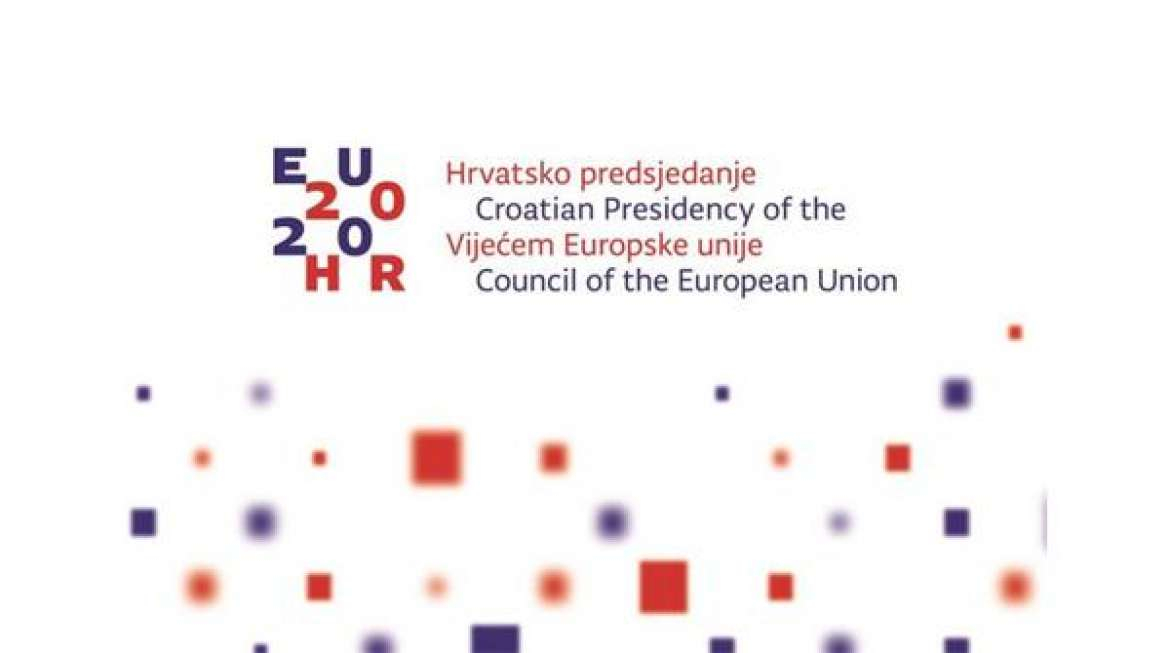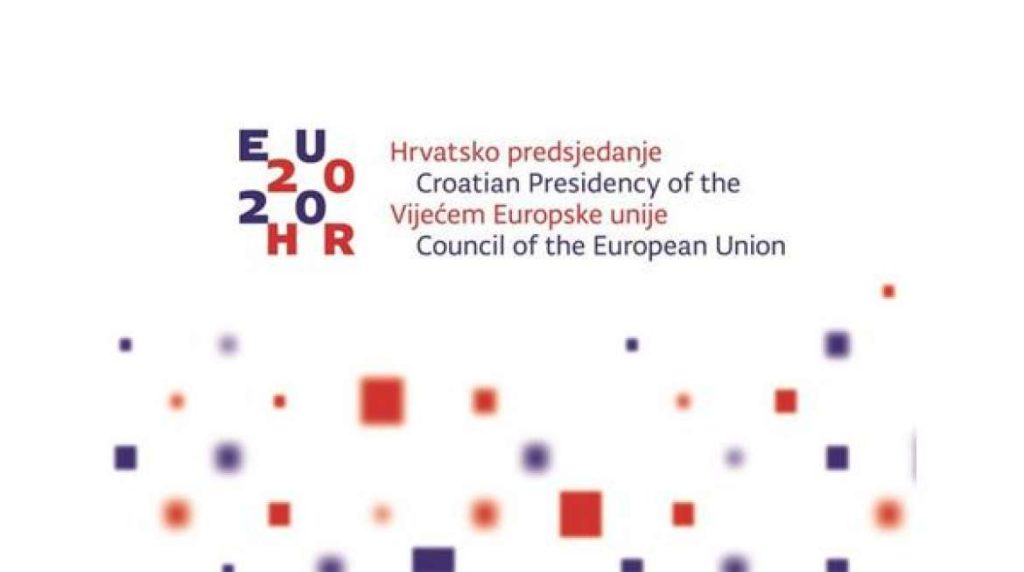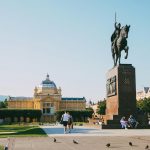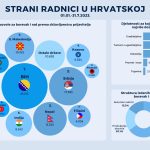
July 1, 2020 – Reflections on the Croatian Presidency from a Brussels point of view – Welcoming Uhljebi to Brussels and how COVID-19 became the best friend of the Croatian presidency.
Two weeks ago, on a business trip to Brussels, I met with several Croatians working in the heart of Europe. Talk inevitably came around to the Croatian EU Presidency, which ended yesterday. I asked how it looked from a Croatian perspective from a longterm Brussels resident. After a few minutes of discussion, I invited him to write his thoughts, as he clearly had a lot to say. This is his account, written on condition of anonymity due to his job.
On 1 January 2020, Croatia took over the presidency of the Council of the EU, for the first time since it joined the European Union in 2013. It was a magnificent moment for the Croatian government and Prime Minister Plenkovic personally. An opportunity to shine and show the presidency as something for which he personally deserved merit. The truth and the facts are very far from this. As we all know, the presidency of the Council rotates among the EU Member States every six months. During this six- month period, the presidency chairs meetings at every level in the Council, helping to ensure the continuity of the EU’s work in the Council. So it is a regular process, as night follows day.
The Croatian presidency’s programme focused on four main priorities: a Europe that is developing, a Europe that connects, a Europe that protects, and an influential Europe, united under the motto ‘A Strong Europe in a World of Challenges’. Indeed, the times could not be more challenging. Not only in the context of the COVID-19 pandemic which constitutes an unprecedented challenge, but also taking into account Brexit, the EU’s long-term budget, the Green Deal and the migration crisis. No less challenging was working with Croatia during the presidency. Although the COVID-19 pandemic was a tragedy it inadvertently helped those involved in the activities of the Croatian presidency. More ironically we could say that COVID-19 was sent to save the Croatian presidency.
You might think it’s a joke, some funny story, or that I am exaggerating?
To give you an overview of the first three months that reflect how the Croatian presidency would look like, we should go back to the beginning of 2019. Why a year ago? Because each country has up to two years of preparations prior to taking the helm of the Council. From the coordination with their Brussels-based people working for the EU institutions and private sector, regional offices, MEPs, for the organisation of meetings, the hiring process, to more operational and technical issues, both in Brussels and at home. But this was not the case with Croatia. I am surrounded by Croats working in diplomacy, regional representations, EU institutions and for the private sector. Most of them are public affairs professionals that were eager to temporarily join the Croatian crew in Brussels and to help their country to lead the presidency. It is a common practice applied by all states.
So, after the Christmas holidays when we were back in Brussels, in mid-January 2019, I met with them and we spoke about the process which should have started already and they were very enthusiastic about it. They were absolutely sure that the upcoming hiring process would be fully transparent so they would be able to apply and with their knowledge and experience in those six months help the presidency. Everyone who works in the EU public affairs sector is familiar with the presidency’s procedures so they were sure that the job vacancies would be published soon.
Since February is mostly a busy period in Brussels, we met at the beginning of March with a completely different approach. They had some inside information that the Croatian Ministry of Foreign and European Affairs would start the hiring process in Spring, but as time passed we were aware that this was not going to happen. To be precise, some processes had already started in late 2017 within the Ministry of Regional Development and EU Funds. Suddenly the word was being spread, people started saying that these positions were ‘reserved’ for who else than Uhljebi, people who are members of the HDZ (Croatian Democratic Union). To explain the familiar Croatian story they just needed to apply and this job was promised to them as well as a high position within the Permanent Representation, without any special skills and qualifications. The most relevant and important criteria was to be a member of the ruling party HDZ.
Unfortunately, even in Brussels, Croatia could not abandon the Uhljebistan way of doing things. So they were not planning to hire experts (Croats!) living in Brussels, assistants to Croatian MEPs whose mandates have just ended, but their plan was to bring to Brussels a bunch of Uhljebs, people they didn’t want in the ministries, state-owned companies and public administration in general and they wanted to get rid of them and send them to Brussels. From Osijek to Dubrovnik, some of them were already working for the representative offices in Brussels and they were waiting for other positions which would ensure that they wouldn’t have to do anything, so maintaining their usual familiar practices.
One of my colleagues called me to tell me the news and she took the words out of my mouth. We all knew what that meant. From that moment on we were sure that the Croatian presidency would be nothing more than a disaster, a waste of taxpayers’ money, without strategy or aim. Everything that followed only confirmed our concerns. Somehow we thought this would not happen this time, because Plenkovic cares too much about the opinion from Brussels, so he would not gamble this time. But it was the opposite, all responsible people in the ministries were familiar with the process, from Zalac who was in charge of the hiring process for their portfolio, together with Pejcinovic Buric, blessed by Plenkovic.
They even published a few vacancies, but these were hilarious and published only to justify the minimum transparency requirements. It was obvious from the job descriptions, the low requirements, the unclear location, to deadlines for interviews that they had already their own people for these positions – “jobs for the boys.” And later these people themselves were complaining in Brussels how complicated the screening and recruitment procedures were, they had to spend a few months in Zagreb, working in the ministries to go through all the necessary security vetting by SOA (Croatian Security and Intelligence Agency). The craziest thing was that theywere still hiring in January 2020, after the start of the Presidency, when they realized they were still short of people and candidates were randomly appearing with no knowledge of what their roles were or what the presidency meant. And Croatian people with a strong background in EU policies, working for the EU institutions again did not get the chance to apply. Why again? Because all of them are people who had left Croatia because of these well-known practices and the Uhljeb environment.
All that followed in the first two or three months of the Croatian presidency was only a reflection on what has already been mentioned. The preparation for the presidency started too late, in August Irena Andrassy was appointed as Croatia’s new Permanent Representative to the European Union, just months prior to Croatia taking over the presidency. Later she would be remembered for ‘Thanks, goodbye and good riddance’ —the EU’s parting words to the UK.
A large part of the criticism of the Croatian presidency refers to; a lack of openness and transparency, lack of structure and coordination, inefficient and slow communication, weak or missing support for prioritised joint EU events on the topics the Croatian presidency would deal with. Simple examples in daily communication with them range from full inboxes, no written correspondence, preference for telephone calls, waiting for feedback for several weeks to incompetent ministers with no relevant knowledge and language skills. Nevertheless, even official meetings were arranged in cafes as it is the custom in Croatia, to the general surprise of the people working in Brussels. Unfortunately, Croatia did not learn anything from its predecessor, Finland, who did a great job in the area of transparency. Increasing the openness and transparency of the European Union has been one of Finland’s goals, they ensured open, professional, reliable and fast communications as well as publishing the information on all meetings of the Permanent Representative and her deputy with lobbyists. Replying to a media enquiry why Croatia did not publish this information, a presidency spokesperson said that Croatia did plan to eventually publish its ambassadors’ meetings on its website, but the site was currently undergoing a redesign, but as you might imagine they were never published.
What will Croatia’s EU presidency be remembered for?
In the broader EU context it will for sure be the violence and abuse of migrants and asylum-seekers by Croatian police on its external borders, Croatian silence on Hungary’s democratic backsliding, but it is also important not to forget Plenkovic’s attempt to push through a government legislative initiative which would suspend labour and social rights at a time when other Member States were trying their best to mitigate the consequences of the pandemic and to support people and jobs. But how could it ever be possible to achieve anything positive when Plenkovic was constantly distracted by the crisis in his government, with the dismissal of ministers due to numerous scandals. One of the last being the dismissal of the health minister Kujundzic in the middle of the COVID-19 crisis. Kujundzic as the Croatian health minister should have been in charge of organising the first emergency EU health ministers meeting in Brussels, chaired by the Croatian presidency. The EU’s health commissioner Kyriakides, had called on Zagreb on 29 January to organize the gathering but as Kujundzic had been dismissed, it took another two weeks for the new minister Beros, to organise the meeting in Brussels which finally happened on 13 February. Plenkovic has since done his best to set up the national COVID-19 crisis centre with his people, members of HDZ to fight the COVID pandemic and to help him spread the image of a perfect Croatia to the world.
When we take everything into account, we can clearly see that there has been no benefit from the Croatian presidency, they spent ten, if not hundreds of millions of Euros, without any positive impact on the economy, tourism or promotion of the Country itself. Without a focus on the country’s investment priorities, support of Croatian companies, without any relevant message. They did not take the opportunity to further position themselves economically and diplomatically within the EU. By the way, we should also say that the Croatian MEPs did not contribute in any way.
If we must choose at least one success of the Croatian presidency without thinking it would be the opening of accession talks with Albania and North Macedonia. The biggest disappointment for Plenkovic for sure was the Zagreb summit which had been planned as a potential milestone in the enlargement process and one of the major High-level events in Croatia. I wouldn’t bet whose disappointment was greater, his or that of Commissioner Suica regarding her plan for the Future of Europe conference and the performance supposed to launch the conference in Dubrovnik on Europe Day.
We can conclude that unfortunately thanks to COVID we were able to avoid all further mistakes, omissions and embarrassments of the Croatian presidency, which would certainly have happened in large numbers. Right now we are witnessing how the Croatian government is barely able to keep the reins in its hands before the presidency ends, to manage the second Coronavirus crisis currently happening in Croatia and to survive the upcoming elections.
Finally, I would like to point out that many extremely dedicated, capable people, were working for the presidency as well. People that were covering for dozens of Uhljebi whose only goal was to have a reference on their CVs and who proudly pointed this out while walking around Brussels. Unfortunately, the Croatian way of working is the same everywhere, and all parties do the same things, corruption still rules Croatia and that is why there are so many Croats in Brussels and all over the world who are not planning to return. If Croatia had been a normal EU country, in the past six months this government would have resigned at least a dozen times, due to various scandals. But given all these negative circumstances, we must never forget the people who are still trying to be the positive change that Croatia needs so much.
On a parting note ahead of the upcoming German Presidency, it is best to just quote Politico “Given that the current Croatian presidency has arguably under performed […] it may be just the right moment to have a powerful nation with a reputation for efficiency, in charge.”








